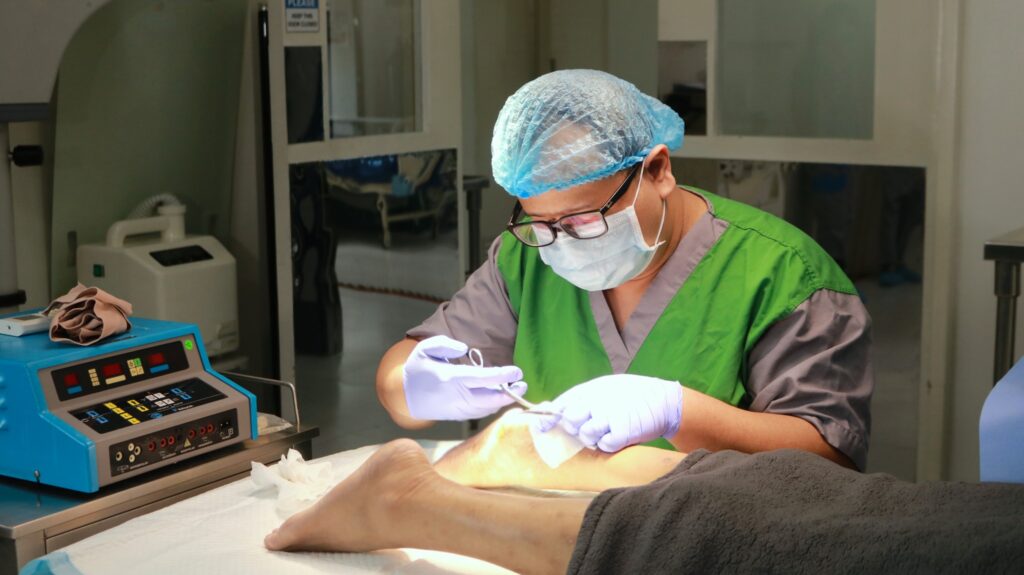Ankle ulcers can be a challenging condition, often causing severe discomfort and impairing mobility. When poorly managed, these open sores can lead to complications such as infections and prolonged healing times. For many individuals—especially those dealing with diabetes or vascular diseases—getting the right treatment is essential. Expert care, such as that offered through orthopedic treatment for ankle ulcers, plays a key role in managing the condition, alleviating pain, and restoring quality of life.
Understanding Ankle Ulcers
Ankle ulcers are open wounds that appear around the ankle area, typically due to poor circulation, constant pressure on the skin, or infections. Often associated with chronic health conditions like diabetes or vascular disease, these ulcers form when blood flow is insufficient to support normal skin regeneration. The reduced circulation means that wounds may heal slowly, increasing the risk of further complications such as deeper tissue infections and in some cases, limb-threatening conditions. Key factors contributing to these ulcers include:
- Poor Circulation: Insufficient blood supply weakens the skin’s ability to heal.
- Diabetes: High blood sugar levels can impair wound healing and lead to nerve damage.
- Vascular Disease: Conditions that affect blood vessel health reduce circulation efficiency.
- Pressure and Trauma: Constant pressure or minor injuries, especially in areas with reduced sensation, can trigger ulcer formation.
Symptoms and Early Detection
Recognizing the early signs of ankle ulcers is crucial. Early detection allows for timely intervention, ultimately reducing the risk of complications. Symptoms may include:
- Persistent sores or wounds in the ankle region
- Redness, swelling, or warmth around the ulcer
- Signs of infection, such as pus or a foul odor
- Pain or discomfort, which may be diminished in cases where nerve damage exists
Early detection and consistent monitoring empower individuals to seek specialized care before minor ulcers develop into more severe issues. Regular self-examinations and professional evaluations—especially for those with known risk factors—can greatly reduce the negative impact of this condition.
Risk Factors and Potential Complications
Several underlying conditions contribute to the development of ankle ulcers. Besides diabetes and vascular disease, factors such as advanced age, obesity, and a sedentary lifestyle may exacerbate the risk. Without prompt treatment, ankle ulcers can lead to severe complications, including:
- Infections: Local infections can spread, sometimes resulting in systemic illness.
- Tissue Necrosis: Reduced blood flow combined with infection can lead to tissue death.
- Mobility Issues: Ongoing pain and discomfort may significantly affect day-to-day movement.
- Amputation: In extreme cases, untreated ulcers might lead to irreversible tissue damage, necessitating amputation.
Understanding these risks lays the groundwork for appreciating the importance of effective, timely treatment and prevention strategies.
The Role of Orthopedic Treatment in Managing Ankle Ulcers
Orthopedic treatment for ankle ulcers is specifically designed to address both the symptoms and the underlying issues that contribute to ulcer formation. Specialized orthopedic care focuses on relieving pressure, enhancing circulation, and promoting efficient wound healing. This approach goes beyond simply treating the surface wound; it involves analyzing and correcting biomechanical imbalances and providing treatments that improve overall limb function. By integrating advanced techniques and expert knowledge, orthopedic specialists aim to minimize risks and expedite recovery.
Key Objectives of Orthopedic Treatment
A comprehensive orthopedic approach to ankle ulcers has three primary objectives:
Managing Infections: Effective infection control is the cornerstone of treating ankle ulcers. Orthopedic specialists often utilize local debridement techniques to remove dead or infected tissue. Combined with an appropriate antibiotic regimen, these methods help clear existing infections and prevent new ones from developing. Timely interventions are essential to halt the progression of an infection, which, if left untreated, could lead to more serious complications.
Promoting Healing: Techniques to promote healing are central in orthopedic treatment for ankle ulcers. Removing pressure points from the affected area is critical, as persistent pressure impedes blood flow and slows recovery. The use of specialized footwear and orthotic devices can redistribute weight and lessen direct trauma to the ulcer site. Additionally, wound care strategies that involve regular cleaning, dressings, and sometimes, advanced therapies like negative pressure wound therapy, contribute to an optimal healing environment.
Enhancing Mobility: Preserving and improving mobility is a key goal in the management of ankle ulcers. Mobility is directly linked to quality of life, and its improvement often requires a multifaceted approach. Physical therapy, combined with assistive devices, not only helps mitigate pain but also strengthens surrounding muscles and supports joint stability. This comprehensive strategy ensures that patients remain as active as possible during their treatment, thus reducing the long-term impact of the condition.
Advanced Orthopedic Interventions: Modern technology has revolutionized orthopedic treatment for ankle ulcers. Advanced surgical techniques and innovative medical devices provide targeted solutions that minimize complications and accelerate recovery. Procedures may include:
- Surgical Debridement: This involves the precise removal of necrotic tissue to promote a healthy wound bed.
- Revascularization Procedures: These procedures aim to restore blood flow to the affected area, thereby enhancing the natural healing process.
- Pressure Redistribution Devices: Customized orthotic supports and offloading devices help redistribute body weight to reduce localized pressure on the ulcer.
These advanced interventions not only tackle the immediate symptoms but also contribute to long-term stabilization and prevention of recurrence.
Comprehensive Care at Tec Orthopedics
A Specialized Approach to Treatment: Tec Orthopedics is committed to delivering tailored, expert care for patients suffering from ankle ulcers. Their method combines cutting-edge medical practices with a patient-centered approach, ensuring that every aspect of the condition is addressed comprehensively. At Tec Orthopedics, the focus is on creating personalized treatment plans that consider each patient’s unique health profile and the specific challenges posed by their ankle ulcers.
Patient Success Stories and Case Studies: One of the most compelling aspects of the approach at Tec Orthopedics is the success seen in patient outcomes. Many patients have experienced significant improvement in both their symptoms and overall mobility following treatment. Anonymous case studies reveal that with the right orthopedic treatment for ankle ulcers, healing times can be reduced, infections are more effectively managed, and patients often return to their daily activities with renewed energy and reduced discomfort. These testimonials serve as both inspiration and a testament to the effectiveness of specialized orthopedic care.
Multidisciplinary Team Approach: The strength of Tec Orthopedics lies in its collaborative, multidisciplinary team. Orthopedic surgeons, wound care specialists, and physical therapists work hand in hand to deliver a holistic treatment plan. This integrated approach ensures that while the wound is being treated at the source, overall limb health and mobility are simultaneously addressed. Such collaboration often leads to better outcomes, as each specialist contributes their expertise to manage different facets of the condition.
Preventive Strategies and Long-Term Management
Lifestyle Modifications and Home Care: Prevention is always better than cure. Patients who have experienced ankle ulcers can take proactive steps to minimize the risk of recurrence. Key strategies include:
- Proper Footwear: Investing in shoes that provide adequate support and cushioning can reduce pressure on the ankle area.
- Routine Inspections: Regularly checking the feet and ankles for any early signs of skin breakdown or ulcer formation is crucial, particularly for those with diabetes.
- Wound Care Education: Understanding how to care for a minor injury at home can make a huge difference. This might involve cleaning small wounds promptly and protecting them from further injury.
- Lifestyle Changes: Adopting a healthier lifestyle with a balanced diet and regular exercise can improve overall circulation and reduce the risk factors associated with ankle ulcers.
Importance of Regular Monitoring and Follow-Up: Regular check-ups with an orthopedic specialist are essential, particularly for patients with conditions that predispose them to ulcers. These follow-ups can help monitor progress, adjust treatment plans as necessary, and catch any signs of recurring issues early. For those with chronic conditions like diabetes, constant communication with health care providers can prevent minor issues from escalating into major complications.
Educational Resources and Support: For many patients, understanding their condition is a critical part of effective management. Access to educational resources—such as detailed articles, instructional videos, or support groups—can empower individuals to take control of their health. Tec Orthopedics offers a range of resources aimed at educating patients about the best practices in preventing and managing ankle ulcers. These resources can be particularly helpful in demystifying complex medical concepts and providing practical advice that patients can apply in their daily lives.
Takeaway
Managing ankle ulcers requires a comprehensive approach that addresses both the immediate symptoms and the underlying causes of the condition. Orthopedic treatment for ankle ulcers has emerged as a powerful tool in this effort by focusing on infection management, promoting efficient healing, and preserving overall mobility. Specialized centers like Tec Orthopedics are at the forefront of this treatment methodology, leveraging advanced techniques and a multidisciplinary team approach to deliver personalized care.
For anyone suffering from ankle ulcers, early diagnosis and intervention are key. With the right treatment plan in place, the risks of complications can be minimized significantly. Patients are encouraged to seek expert advice and undergo regular monitoring to ensure the best possible outcomes. Through a combination of cutting-edge treatments, preventative measures, and ongoing support, it is possible to reduce the impact of ankle ulcers and maintain a high quality of life.
In conclusion, if you or a loved one is dealing with the challenges of ankle ulcers, consider exploring specialized orthopedic treatment options. With a focus on advanced interventions and personalized care, Orthopedic Treatment for Ankle Ulcers can pave the way toward effective healing and a return to an active, pain-free lifestyle.






